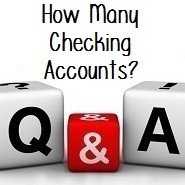Awhile ago we asked you if you had any questions you’d like answered, as @billclancy (Bio here) from Northpointe Bank (who offered a 5% rewards checking account that we’ve covered before here) agreed to answer them. It took me awhile to finally send the questions to Bill (and he responded to them within 24 hours). Without further ado, here are the questions you wanted answered.
Contents
- 1 Questions & Answers
- 1.1 Question from Nick on Money Orders, Manufacturing Spending & Money Laundering Concerns
- 1.2 Question from Chuck on Credit Reports and Obtaining Loans
- 1.3 Question from Drew on Instant Transactions vs. 3-5 Day ACH Transfers
- 1.4 Question from Tom on Rewards Checking – How Can Banks Afford to Offer Above Market Rates?
- 1.5 Question from Harrv On Authorized User Card Numbers
- 1.6 Question from Will (Me) On Interchange Fees
- 2 Final Thoughts + Opportunity For More Questions
Questions & Answers
Question from Nick on Money Orders, Manufacturing Spending & Money Laundering Concerns
Q: If you’re depositing a lot of money orders from manufactured spending (i.e. using credit cards to buy money orders directly or indirectly) can you prevent a bank account shutdown by sharing the details with the bank about how you’re NOT money laundering? Remember manufactured spending is not “illegally-gained proceeds” and would not constitute money laundering, but MS is often confused with money laundering.
A: Unfortunately, this is not a cut-and-dry situation. Some banks and credit unions (financial institution or “FI”) would accept your documentation and allow it to continue. Some wouldn’t deem it suspicious and wouldn’t even want the documentation. Others would deem this highly suspicious and shut down your account regardless of documentation. Money orders are not subject to CTR reporting but if the FI deems it suspicious activity, they can file Suspicious Activity Reports (SAR).
In terms of how to best use the “From” field on money orders. Again, this will be case-by-case based on the FI and even vary somewhat between branches within a particular FI. As a general rule, the more specific information on the money order, the better. As a banker, I’d rather see an entry that reads “June Discover Card Spending” vs. having it left blank.
A question arose about $100k-250k worth of money orders transacted per month. At such as large dollar amount, it’s extremely unusual behavior which is a red flag. Legitimate or not, it attracts concern and attention…never a good thing. Most banks aren’t interested in that type of business. What is attractive to FIs are revenue producing products and activities – loan, investment or insurance relationships; large deposit accounts, debit/credit card spending activity and fee revenue. Probably not the answer you wanted but it’s the reality of the situation.
Question from Chuck on Credit Reports and Obtaining Loans
Q: How long before taking out a mortgage should we keep a clean credit report? What about a car loan – is it necessary?
A: The longer it’s clean, the better. But it’s all relative. Lenders consider the Three C’s when making a loan – capacity, collateral and credit. These are a sliding scale that work in conjunction with each other. Capacity is the ability to repay the loan. What is your income, what other debts to you have (monthly payments, total debt, debt as a percentage of your limit, how recent is the debt, etc.). Collateral is what is securing the loan – auto, home, a bank account or nothing (such as a credit card)? Credit is what you are inquiring about. Credit is irrelevant if you can’t afford the payment. It’s also highly unrealistic to obtain a $100k+ unsecured loan for most people even if you have a credit score of 800+ and never missed a payment. These three items work together to determine loan amounts and rates. And each FI uses different applications of this formula to determine their loan terms.
Question from Drew on Instant Transactions vs. 3-5 Day ACH Transfers
Q: Given advances in technology, our society has begun to move to an “instant gratification economy”. Yet, as an example. when I transfer money via my bank it still usually takes 5 business days.
A: Technology in the banking industry is truly a sad state of affairs. 95%+ FIs operate on legacy core systems that were developed 20-30 years ago. The situation gets even more complicated when you think about the consolidation of the industry over that timeframe. Mergers and acquisitions since the 1970s have decreased the number of U.S. banks and credit unions from over 50,000 to around 11,000 today. The outcome of all the M&A activity is Frankenstein type systems where one system is bolted onto (more like duct tapped) together to work with another system that’s not really compatible. It’s why so many banks today continue to operate on nightly batch processing of checks and electronic deposits vs. real-time operations. The technology exists to change all this. But it’s really, really expensive and a logistical nightmare for the mega banks to switch out all this outdated technology. And they serve 80% of the consumer market. If they don’t do it, most smaller FIs will continue to wait until they are forced to make this change out of competitive necessity.
I’ll add that there have been strides taken in the last few years to at least update the front-end systems facing the customer. Today’s websites, online banking and mobile banking technology is often quite good. But it’s connected to these outdated back-end systems on the bank’s side which hold us bank from seeing the real-time transfers that are standard banking in Europe, Asia and the rest of the world.
Question from Tom on Rewards Checking – How Can Banks Afford to Offer Above Market Rates?
Q: How do banks make money on rewards checking accounts paying significantly more than market rate interest? Is the assumption that you’ll lose money on the interest payment but make money on other services (credit card swipe fees, credit card interest, overdraft fees, mortgage loans, etc) provided to that customer?
A: Good question, and one I can offer very specific insight into given my 10 years of experience at FIs offering this product. You’re spot on in identifying the other services that drive revenue which justify how an FI can pay 3-4%+ on a checking account. All banks have enough data to know what the average revenue will be per product or service that you mention – it becomes simple math to calculate what percentage of checking customers will open a mortgage or credit card, how much debit/credit card swipe income to expect per account, etc. Once that step is complete, it’s about setting the rate and balance cap to fit with the bank’s funding needs (remember – the general FI operating model never changes; we accept deposits and make loans and the difference in interest rates between those two activities drives income for the bank). So, it’s not a loss leader per se. I’d classify it more as a strategic marketing tool for community banks and credit unions to offer more value to consumers to offset real or perceived lags in technology and branch networks vs. mega banks.
Question from Harrv On Authorized User Card Numbers
Q: Why do some banks like Amex and Barclays require authorized user credit cards to have a separate number from the primary card holder while others like Citi and Chase give the authorized user the same credit card number as the primary card holder?
I’m not able to answer Comment #208143 about same vs. different card numbers for authorized users. I can’t think of any reason for this but I’ve only seen it done one way in my career so not enough experience or expertise in this area to assist w/ this one
Question from Will (Me) On Interchange Fees
Q: Any insight on what percentage of the interchange fee smaller credit unions receive and what the breakdown is compared to revenue from fees/interest charges?
For your question about credit card interchange – larger FI and card issuers are able to negotiate better interchange rates based on the size of their card portfolio and transaction volume but in general an overall debit/credit card swipe rate of 1.00% is a solid estimate. Credit purchases tend to pay in the 1.25% range and debit is 0.60%. But each FIs mix of debit or credit swipes do vary and large FIs may be more in the 1.10% range while smaller FIs could be 0.90% or lower.
Final Thoughts + Opportunity For More Questions
First of all a big thanks to Bill Clancy from Northpointe for taking the time to answer these questions in detail, I really enjoyed reading the responses, if you haven’t already I’d recommend checking out their 5% rewards checking account. We’re also working on something with Northpointe which will hopefully be launched in early Q2.
Bill has also agreed to answer any other questions you might have from him, rather than asking here (let’s keep that for discussion of these answers) go over and ask them here.
Note: It should go without saying, but I’ll say it anyway. We don’t have any financial relationship with Northpointe and didn’t receive anything in return for this series (apart from the answers provided above). Bill suggested it and I thought it would be a fun idea.







Hi, i ead your blog occasionally annd i own a similar one and
i was just wondering iif you get a lot of spawm
remarks? If soo how do you stop it, any plugin oor anything
you can suggest? I get sso uch lately it’s driving me mad so any assistance is
very much appreciated.
Great info. Lucky me I discovered your site
by accident (stumbleupon). I have book marked it for later!
I needed to thanbk you for this good read!! I absolutely llved every little bit of it.
I’ve gott yoou book-marked to look at new things you post…
“Money orders are not subject to CTR reporting…” -Bill Clancy
This is incorrect. I’m surprised someone with 15+ years of experience in consumer banking doesn’t know this.
I have extensive knowledge of CTRs and the various regulations FIs are subject to, and what Joe said is correct. Money orders ARE subject to a CTR. Although, Bill is correct in saying that a bank branch could also file a SAR if they suspect suspicious activity (This applies to any transaction, not just money orders). A SAR is not something you want and the worst part is that you will never know if one has been filed against you as it is against the law to inform someone that a SAR is going to be / has been created on them.
I thought obtaining a report from ChexSystems would (a) show any reported SARs that (b) could be disputed. Is this incorrect? Or when you say it’s illegal to “inform”, are you making a distinction between announcing a SAR to someone versus someone requesting the data?
Yes, thank you for the insights.
Superb q&a, and many thanks for the many helpful insights and candor. I, for one, will keep Northpointe in high regard and high on radar for future business. 🙂
Re. Drew’s question about why do many banks still take 3+ days and more to clear ach transactions, that’s an especially intriguing answer, seeming to suggest that the recent intense m&a activity in the realm has created a logjam of dated technology and apparent inertia against fixing the mess.
So contrary to all the mantra we so often hear from CNBC, Faux, et. al. about how wonderful, how “natural” m&a activity is for the health of our capitalist system, this would seem then to be an argument to the contrary, and one more reason to vote for Bernie (“break up the big banks”) Sanders. 🙂
ps, this line is among many memorable passages.
“The outcome of all the M&A activity is Frankenstein type systems where one system is bolted onto (more like duct tapped) together to work with another system that’s not really compatible”
I hope we read and see much more of Bill Clancy in the future. (Will, thanks again for this interview — such candor a breath of fresh air. Am forwarding to my favorite uva Business School dean. 🙂 )
Glad you enjoyed the answers, I was somewhat surprised but how detailed and honest they were!
Agreed, quite interesting, and good read!
Outstanding post. Thank you!
Really nice feature!
Glad you enjoyed it, George. Now we just need people to ask some more questions so we can get some more answers!
Hey, I have received a bonus from Amex a month ago with a transaction that can be cancelled later…I wonder what will happen to my bonus points if I cancel the transaction now?
They might get clawed back, I wouldn’t risk it.
Good stuff. Thanks to everyone for this!